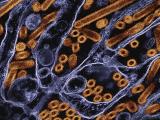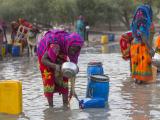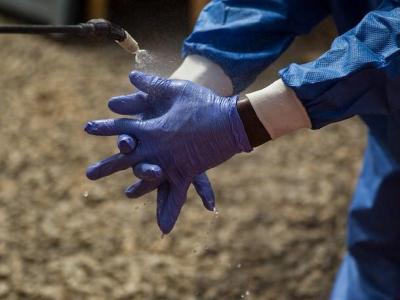Jan 3, 2011
Egypt reports 3 more H5N1 cases, 2 fatal
Egypt's health ministry over the past 3 days has announced three new H5N1 avian influenza cases, two of them fatal, according to media reports, some of them translated by members of the FluTrackers infectious disease message board. On Jan 1 officials announced that a 25-year-old woman from Qena governorate died from an H5N1 infection on Dec 29 and that a 27-year-old man from Ismailia governorate is hospitalized in stable condition with the virus, Daily News Egypt, an English-language newspaper based in Giza, reported today. Also today, health ministry spokesman Abdel Rahman Shahin announced another H5N1 death, in a 40-year-old man from Dakahlia governorate, according to a health ministry post translated by FluTrackers. The notice did not say when the man got sick but noted that his death is the first from the H5N1 virus in 2011. Egypt, which has recently experienced numerous 2009 H1N1 cases, has reported seven H5N1 cases, including four
deaths, since early December 2010. Accounts of the three newest cases didn't contain details about symptom onset or exposure to sick birds. If the World Health Organization (WHO) confirms these cases, Egypt's count will rise to 118 cases and 40 fatalities.
Jan 3 FluTrackers thread
South Korea battles H5N1 and FMD outbreaks
Animal health authorities in South Korea are battling now-confirmed H5N1 avian influenza outbreaks in poultry and a foot-and-mouth disease (FMD) outbreak in cattle, according to news reports. On Dec 31 officials confirmed the H5N1 virus at two poultry farms, one in the central city of Cheonan and the other in the southwestern city of Iksan, according to a Dec 31 Agence France-Presse (AFP) report. The agriculture ministry said the outbreaks marked South Korea's first outbreaks in 2 years. Authorities culled 10,700 ducks at the farm in Cheonan and 17,000 chickens at the farm in Iksan to control the spread of the virus, AFP reported. In a related development, tests on five wild ducks found dead near Sacheon City on Dec 26 were positive for the H5N1 virus, South Korea's agriculture ministry reported on Jan 1, according to AFP. Sacheon City is located on South Korea's southern coast. Meanwhile, an outbreak of FMD reported to be the country's worst
has spread to cattle and pig farms in five cities, with 74 confirmed cases in animals since late November, according to an AFP report today. Officials estimate that slaughtering animals to control the spread of the outbreak so far amounts to $350 million in losses. An agriculture ministry official said the agency is investigating more suspected cases and that authorities are having a hard time keeping up with new cases. South Korea has vaccinated about 450,000 cattle since Dec 25, a move expected to lengthen export bans.
Dec 31 and Jan 1 AFP stories
To fight dengue, Australia scientists to deploy bacteria-infected mosquitoes
In an experiment designed to stop mosquitoes from passing the dengue virus to people, Australian scientists plan to release thousands of mosquitoes that carry a bacterium that protects them from the virus, according to press reports. The mosquitoes are infected with Wolbachia, which acts like a vaccine by using resources needed by the dengue virus, the Australian Associated Press (AAP) reported today. The mosquitoes, which were bred at James Cook University in Cairns, Australia, are to be released starting tomorrow in the launch of a 12-week field trial in two suburbs of Cairns, the story said. In December the scientists took steps to reduce existing mosquito populations in the field trial area. "By April, we should know if we are on the right track or not," said University of Queensland biologist Scott O'Neill, leader of the project, according to a report today in The Australian. The
story said dengue fever is not common in Australia, but there were about 1,000 cases in Cairns last year. O'Neill said mosquitoes transmit the bacteria to their offspring, but they do not spread to humans or other mammals. The $18 million trial was funded by the Bill and Melinda Gates Foundation and approved by the Australian Pesticides and Veterinary Medicines Authority, the report said. If the initial trial is successful, trials in Vietnam and Thailand will follow.
Jan 3 AAP story
Jan 3 Australian story
Cholera deaths in Haiti reach 3,333
The cholera case count in Haiti reached 148,787 last week, with 3,333 deaths, the Pan American Health Organization (PAHO) reported in its latest update on Dec 30. The number of patients hospitalized totaled 83,166, and the overall case-fatality rate was 2.2%. The Haitian government estimates there will be 400,000 cases over the first year of the epidemic, which began in October, the agency said. The supply of medicines is adequate for treating cases expected in the near term, but distributing the supplies is a complex problem and is further complicated by poor security in some areas, officials said. In the North department (province), the epidemic has entered a second phase involving new clusters of patients in remote areas, which makes the response more difficult, PAHO said.
Dec 30 PAHO update
Flu vaccine found generally effective in young kids
Two doses of trivalent inactivated influenza vaccine (TIV) proved effective in preventing illness in more than half of children aged 6 months through 5 years, according to an observational study in Japan. Researchers observed 14,788 children over the course of six flu seasons from 2002 to 2007, during which the average two-dose vaccine uptake was 52.9%. The effectiveness of two doses—which was estimated by the relative risk of flu illness and hospitalizations and the reduction in all respiratory illness—varied between 42% and 69% over the study period. The greatest effectiveness occurred in 2002-03 season, when the vaccine strains matched well with circulating strains. Overall effectiveness was 52% against influenza A and 59% against influenza B. The authors conclude, "Vaccination with two doses of TIV was consistently effective in preventing influenza-associated clinic visits and hospitalizations."
Dec 31 Vaccine
study
Ireland will not open flu vaccine clinics for all
Ireland's Health Service Executive (HSE) has decided not to reopen free influenza vaccination clinics for all Irish residents in spite of rising cases of influenza-like illness (ILI), the Irish Independent reported today. The HSE's director of health protection, Dr Kevin Kelleher, said an HSE advisory committee ruled that only at-risk groups, including pregnant women, will be immunized with seasonal flu vaccine, which includes the pandemic 2009 H1N1 strain. Kelleher said the increase in flu activity is typical of seasonal flu. The most recent data indicate that Irish general practitioners are being consulted for ILI at a rate of 62.7 per 100,000 population, well below the epidemic threshold of 200 per 100,000 population, with the east and south of Ireland hit hardest. In related news, Jordan has confirmed 50 cases of pandemic H1N1 in the past month, with 1 patient in critical condition, the Kuwait News Agency (KUNA) reported.
Jan
3 Independent story
Jan 2 KUNA report

















